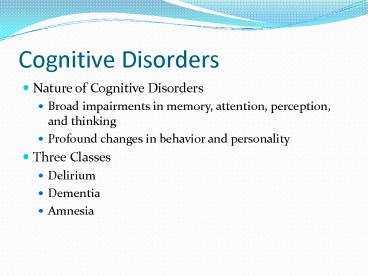Cognitive Disorders - PowerPoint PPT Presentation
1 / 9
Title:
Cognitive Disorders
Description:
Cognitive Disorders. Nature of Cognitive Disorders. Broad impairments ... Parkinson's Disease. Huntington's Disease. Pick's Disease. Creutzfeldt-Jakob Disease ... – PowerPoint PPT presentation
Number of Views:207
Avg rating:3.0/5.0
Title: Cognitive Disorders
1
Cognitive Disorders
- Nature of Cognitive Disorders
- Broad impairments in memory, attention,
perception, and thinking - Profound changes in behavior and personality
- Three Classes
- Delirium
- Dementia
- Amnesia
2
Delirium
- Key Features
- Impaired consciousness and cognition
- Impairments develop rapidly over several hours or
days - Examples include confusion, disorientation,
attention, memory, and language deficits - Medical Conditions Related to Delirium
- Drug intoxication, poisons, withdrawal from drugs
- Infections, head injury, and several forms of
brain trauma - Sleep deprivation, immobility, and excessive
stress
3
Treatment and Prevention of Delirium
- Treatment
- Attention to precipitating medical problems
- Psychosocial interventions include reassurance,
coping strategies
4
Dementia
- Key Features
- Gradual deterioration of brain functioning
- Affects judgment, memory, language, and advanced
cognitive processes - Dementia has many causes and may be reversible or
irreversible - Impairments have a marked negative impact on
social and occupational functioning
5
DSM-IV Classes of Dementia
- Dementia of the Alzheimers type
- Vascular Dementia
- Dementia Due to Other General Medical Conditions
- Parkinsons Disease
- Huntingtons Disease
- Picks Disease
- Creutzfeldt-Jakob Disease
- Substance-Induced Persisting Dementia
- Dementia Due to Multiple Etiologies
- Dementia Not Otherwise Specified
6
Range of Cognitive Deficits
- Aphasia
- Speech and word usage deficits
- A-Phrase-ya
- Apraxia
- Task and coordination deficits
- A-practice-ya
- Agnosia
- Recognition deficits
- I dont knows ya
- Executive Function
- Deficits in planning, organizing, sequencing, or
abstracting information
7
Progression of Dementia
- Initial Stages
- Memory impairment, visuospatial skills deficits
- Agnosia and facial agnosia
- Other symptoms Delusions, depression,
agitation, aggression, and apathy - Later Stages
- Cognitive functioning continues to deteriorate
- Person requires almost total support to carry out
day-to-day activities - Death results from inactivity combined with onset
of other illnesses
8
Treatment of Dementia
- Medical Treatment Best If Enacted Early
- Few medical treatments exist for most types of
dementia - Attempt to slow deterioration
- Do not actually stop progression of dementia
- Psychosocial Treatments
- Focus on enhancing the lives of dementia patients
and their families/caregivers - Teach adaptive skills
- Use memory enhancement devices (e.g., memory
notebook) - Main emphasis of psychosocial interventions is on
the caregivers (help caregivers cope and help
them help the patient)
9
Amnestic Disorder
- Nature of Amnestic Disorder
- Circumscribed loss of memory
- Inability to transfer information into long-term
memory - Often results from medical conditions, head
trauma, or long-term drug use - The Example of Wernicke-Korsakoff Syndrome
- Caused by thalamic damage resulting from stroke
or chronic heavy alcohol use - Attempt to restore thiamine deficiency in the
case of chronic alcohol abuse - Research on Amnestic Disorders Is Scant































